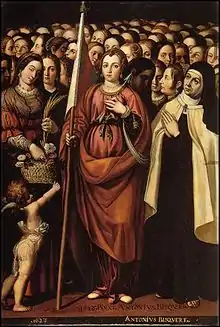
Antonio Bisquert (1596 – 1646) was a Spanish painter of the Baroque period.
He was born in Valencia, where he became a pupil of Francisco Ribalta. He established himself at Teruel in 1620 where he got married.
In his works, religious and subject always to a clientele that, in his case, it seems exclusively ecclesiastical and intended for the decoration of religious buildings, such as the great pictorial cycles of the life of San Lorenzo for your church or Huesca of the Life of St. Vincent for San Gil in Zaragoza, formerly attributed to Jusepe Martínez, can stand a manifest good taste for the representation of everyday objects and supporting details.
Antonio Ponz, on a visit to the Teruel Cathedral, praised his altarpiece of the Eleven Thousand Virgins signed "1628: Pinxit: Antonius Bisquert" and holding him by "Professor of much merit". The art historian Juan Agustín Ceán Bermúdez compiled some news about him in his historical Dictionary. He died in 1646.
References
- Bryan, Michael (1886). Robert Edmund Graves (ed.). Dictionary of Painters and Engravers, Biographical and Critical. Vol. I: A-K. London: George Bell and Sons. p. 131.
- Cean Bermudez, John Augustine, Historical Dictionary of the most illustrious professors of the fine arts in Spain, Madrid, 1800.
- Alemparte Ferreiro, Jaime. (1991). The legend of the eleven thousand virgins. His relics, cult and iconography. Murcia: Murcia University. ISBN 84-7684-249-X.
- Pérez Sánchez, Alfonso E. (1992). Baroque Painting in Spain 1600–1750. Madrid: Ediciones Chair, p. 156, 276, 279. ISBN 84-376-0994-1.
- Several authors (1995). The painter Antonio Bisquert 1596–1646. Teruel Teruel County Council. Turolenses Studies Institute. ISBN 84-869-8247-2.